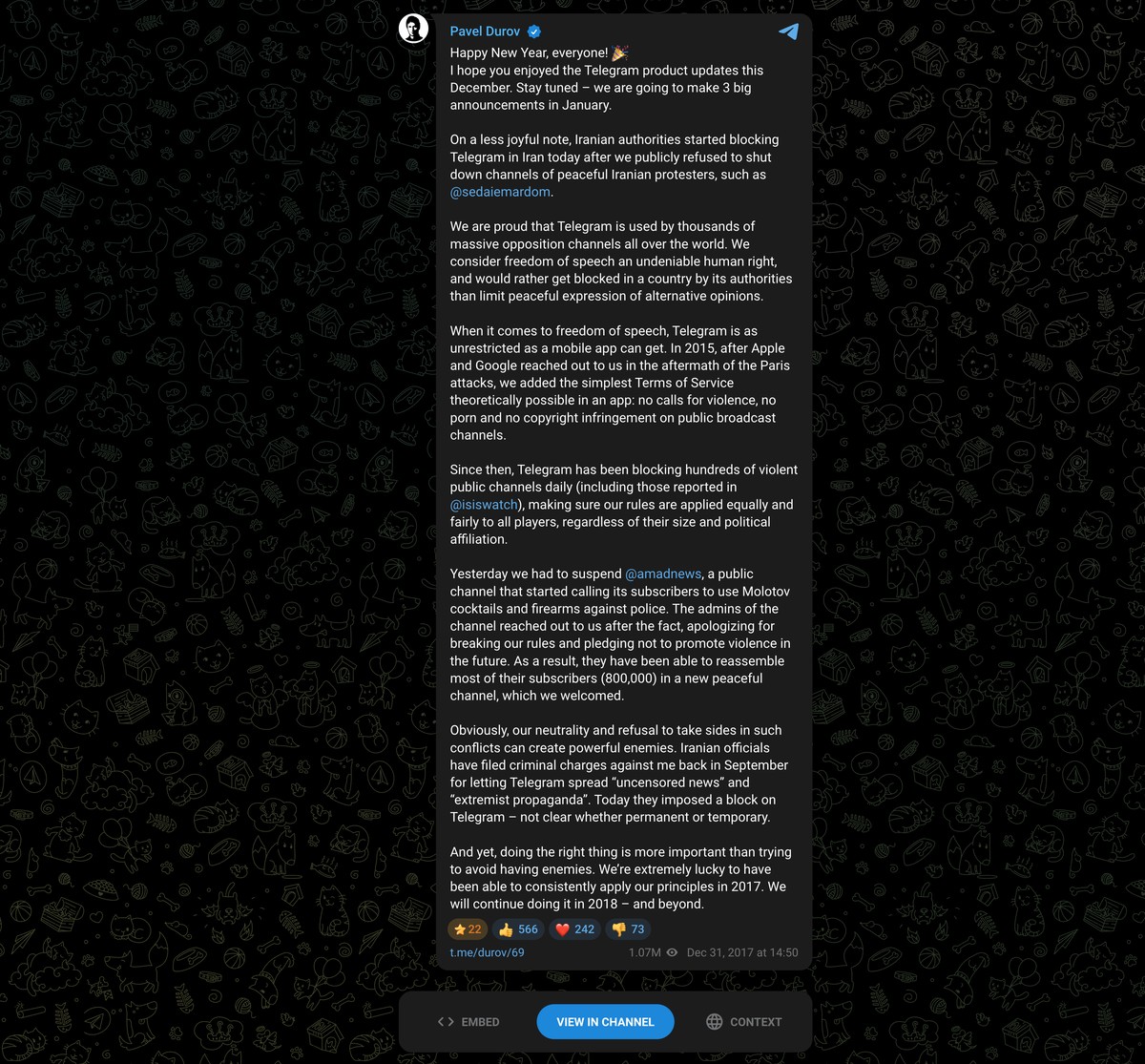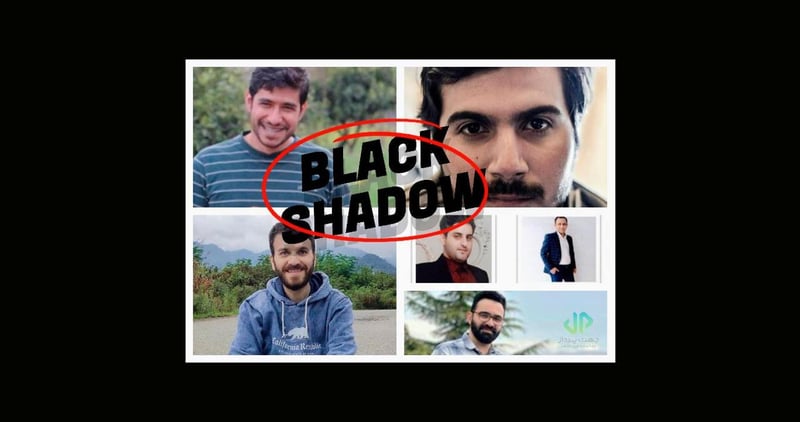The Islamic Republic is floating the idea of unblocking Telegram again, and if you believe this is about digital freedom, I have a bridge in Tehran to sell you.
Elias Hazrati, head of Iran's Government Information Council, recently claimed the delay in lifting Telegram's filter was due to "recent conflicts." But let's be honest about what's really happening here. With daily power outages now affecting half the country and Europe triggering sanctions snapback, the regime knows what's coming: protests. Big ones.
Remember Rouhollah Zam
We can't discuss Telegram in Iran without remembering Rouhollah Zam. His Amad News channel had 1.4 million followers coordinating protests during 2017-2018. The regime demanded Telegram shut it down. When Telegram refused, Iran blocked the entire platform. They lured Zam from France to Iraq, kidnapped him, and hanged him in December 2020.
Now suddenly they want to unblock the same platform? Only if Telegram plays ball this time.
The timing is no coincidence. Iran faces its worst energy crisis ever - 20,000 megawatt shortages, schools closing, factories shut down. Southern Tehran gets 32% of power cuts while rich northern districts see only 1%. Add 38% inflation, the rial at one million per dollar, and youth unemployment over 20%. These are protest conditions, and the regime knows it.
Here's what they've figured out: When 81% of Iranians use VPNs to access blocked sites, the government can't monitor anything effectively. But here's their new play - unblock Telegram, then demand cooperation.
Last year, Mehr News revealed the regime's digital strategy roadmap, and it's chilling: "reopening Telegram after negotiations conditional on accepting conditions approved by the Article 4 working group, and providing Telegram through domestic platforms if no agreement is reached." Translation: Give us control or we'll create our own government-controlled version.
This is exactly what they tried before. Remember 2018? Iran demanded Telegram block Amad News and other protest channels. Pavel Durov refused, saying "Iranian authorities want to use Telegram to spy on their citizens." That's when they blocked it completely. Now with Durov facing legal pressure in France (unrelated charges, but still pressure), they might think he's more vulnerable to negotiation.

Think about it. They unblock Telegram tomorrow. Then they demand: Block protest coordination channels. Remove opposition content. Share user data for "terrorism investigations." Hand over IP addresses of anonymous channel admins. And if Telegram refuses? They'll route everything through their own servers - a fake "Iranian Telegram" they fully control.
Right now, with VPNs, the regime gets nothing. But with official unblocking comes official leverage. "Nice platform you have there," they'll say. "Shame if we had to block it again." Every government request, every compliance demand, every threatened re-blocking becomes a tool for control.
Pavel Durov has consistently stood against Iranian censorship demands. Back in 2018, he famously rejected Iran's demands to censor channels and share user data, stating that "Iranian authorities want to use Telegram to spy on their citizens." This principled stance led to Telegram's blocking in Iran.
The regime might be hoping that international pressure or changing circumstances could create an opening for negotiations. But Durov has shown remarkable consistency in defending user privacy against authoritarian demands, from Russia to Iran. His track record suggests Telegram won't easily compromise its principles.
The Reformist Con Game
President Pezeshkian campaigned on internet freedom. What did he deliver? A crackdown on VPN sales in October 2024. They unblocked WhatsApp in December - big deal. Instagram, YouTube, Twitter, and Telegram remain filtered.
Think about the absurdity: the same regime that blocked WhatsApp now wants applause for unblocking it. They create the problem, partially solve it, and call it "reform." It's like an arsonist wanting credit for putting out half the fire they started.
It's the same playbook Rouhani used, the same one Khatami tried. Promise reform, deliver repression, blame the hardliners.
The Supreme Council of Cyberspace, created by Khamenei and sanctioned for human rights violations, calls the shots anyway. Parliament has 136 MPs condemning unfiltering as a "gift to enemies." This isn't about competing factions - it's about regime survival through deception.
The regime makes $7.14 billion annually from VPN sales - more than their two largest mobile operators combined. But blocking costs them too - $1 million daily in economic damage, 100,000 lost jobs. They've wasted $95 million on domestic apps like Soroush and Bale that nobody trusts.
So here's their calculation: Unblock Telegram, save the economy, then squeeze the company for compliance. Every blocked channel, every data request, every "cooperation" becomes a negotiating point. It's cheaper than building surveillance infrastructure and more effective than failed domestic apps.
What's Really Happening
This isn't China's WeChat model where everything flows through government servers. This is more insidious - unblock the platform, then use that access as leverage for demands.
When Hazrati talks about platforms needing to "comply with local regulations" and open offices in Iran, he's telegraphing the plan. Unblock first, then demand: Remove this channel. Block that keyword. Share these IP addresses. Ban those accounts. Each refusal risks re-blocking, and millions of Iranian users become hostages to compliance.
Their statement that filtering makes surveillance "double or triple" harder reveals the strategy: legal access means legal pressure. A blocked platform can ignore you. An operating platform needs to negotiate.
As someone who's watched this regime's tricks for years from London, I can tell you this: they're not offering freedom, they're setting up a hostage situation. Millions of Iranians desperate for unfiltered access become leverage against Telegram.
With power grids failing and sanctions returning, protests are inevitable. The regime knows this. They want Telegram operational but compliant - blocking protest channels on demand, sharing user data when asked, becoming another tool of control.
Don't fall for it. The Islamic Republic doesn't do favors for the opposition. When they "unblock" something, there are always strings attached - and those strings lead right back to Evin Prison.
They learned from Zam's execution that crushing platforms creates heroes for the opposition and drives users to alternatives. Now they want to co-opt instead of combat. It's smarter, it's cheaper, and it's more dangerous.
The real tell? They're having these discussions now, just as the country faces its perfect storm of crises. That's not reform. That's preparation for controlling the narrative when the protests begin.



